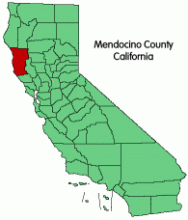Mendocino County Local Leaders Want to Leave the Slow Lane Behind
VisitMendocino.com sums up this northern California community as a peaceful and serene:
"Mendocino County, where rugged coastline, breathtaking beaches, picturesque villages, majestic redwood forests and America's Greenest Wine Region beckon you to escape to a slower pace."
While the people of Mendocino County love life in the slow lane, they would love a fast lane for the Internet. Mendocino County, known for its wineries, its redwoods, and its greenery is now becoming known for its efforts to develop their own community-owned broadband.
The Mendocino County Broadband Alliance (MCBA) was borne out of a need to fill gigantic gaps in broadband coverage created by the private sector. The geological and rural nature of the area presents an insurmountable challenge to the private cable and telco business models in this spacious county of just under 88,000 residents. While there is still archaic dial-up service, spotty and unreliable satellite access, and a few communities with DSL, the MCBA reports that over half of the population has NO access to broadband.
Community leaders in Mendocino County have contemplated the need for access in their area for some time. What really drove home the urgency of the situation was the 2011 death of Esplanade, Mendocino County's small, local, independent ISP. Carol Brodsky, of the Anderson Valley Advertiser, spoke with MCBA for the story:
When Esplanade, a small, privately owned south-coast Internet service provider closed its doors in 2011, around 400 customers were left in digital darkness, according to Greg Jirak, strategic planning chair for the Mendocino County Broadband Alliance. The resultant issues cascaded and greatly affected the lives of individuals, organizations and businesses.
Jirak goes on to describe other ways Mendocino County has suffered due to the loss of a large part of the scanty Internet coverage they had:
“When Esplanade folded, the Coast Community Library was no longer able to provide public Internet access,” Jirak explains.



